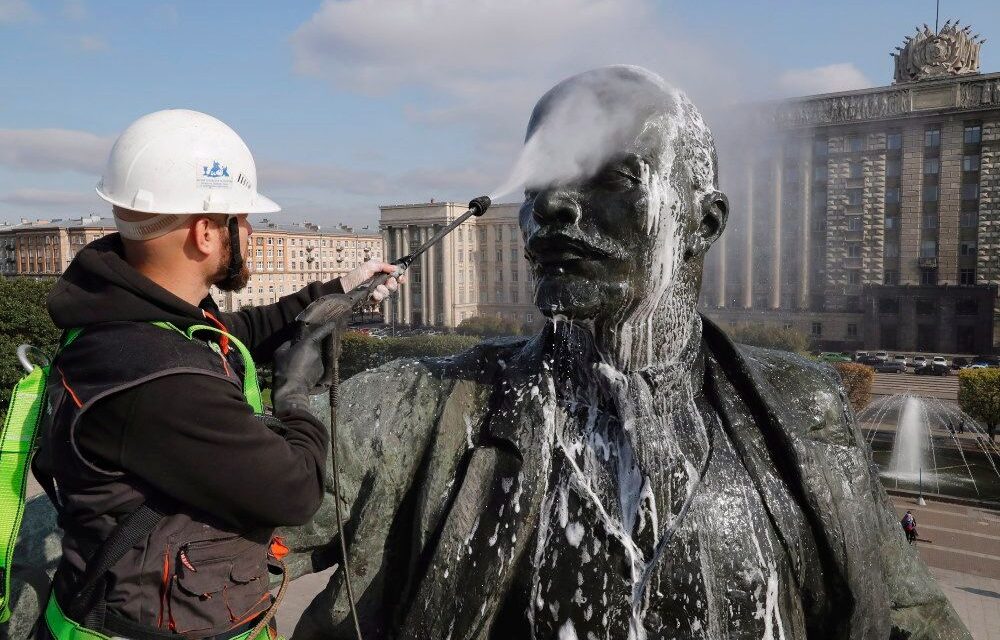"The foreign cult that was forced on us never became part of Hungarian public consciousness, so it was easy to get rid of Lenin," says historian Attila Kolontári, scientific researcher at the Office of the National Remembrance Committee.
According to contemporary recollections, Lenin was a "bad-tempered, mischievous little boy". Is this true?
There is no doubt that he had a penchant for commiseration.
Based on his recollections, he was a hysterical, demanding child who quickly learned how to be the center of attention and, more importantly, how to manipulate his environment. Many times he was able to impose his will on his older brothers as well. Of course, these qualities alone did not predestiny him for the historical role that came to him as part of the class.
What drove Lenin towards the Marxist system of ideas? You can also read an opinion that a decisive trauma in his life was when his brother was executed for the assassination attempt against the Russian Tsar.
It is difficult to single out a single moment that led him to this path. In the second half of the 19th century, many young Russian intellectuals ended up in some branch of the revolutionary movement. But there is no doubt that
the execution of his brother Aleksandr Ulyanov in 1887 III. For the planned assassination attempt against Tsar Alexander, it was a moment that had a strong impact on Lenin's worldview and emotional world.
Lenin came from a "mixed" family of Russian intellectuals, with Russians, Germans and Jews among his ancestors. The family's real social rise began with his father, Ilya Ulyanov, who, as an inspector of folk schools in the Simbirsk governorate, earned the title of state councilor and hereditary nobility. The death of the father and the execution of his brother undoubtedly marked a serious break in the family's life, but Lenin could still have graduated from university, obtained a law degree and even practiced as a lawyer.
There are historians who believe that Lenin led Russia out of World War I, which they write in his favor.
It is more accurate to say that Lenin led Russia from World War I to the civil war, which lasted until the summer of 1921 in the European parts of the country, and until June 1923 with the follow-up battles in the Far East. In the World War, in the mobilization and arming of millions of armies, Lenin already saw in 1914 the possibility of not only the Russian revolution, but also the world revolution, if the masses turned their weapons against their "own oppressors".
It is also widely believed that Lenin was actually an agent of the Germans, which is how he could become the leader of the proletarian revolution. Is this true?
During the years of the First World War, Lenin was in exile in Switzerland with several of his comrades. After the February revolution and the abdication of the tsar, they immediately started looking for the opportunity to return home. As a belligerent against the Russians, the Germans recognized that Lenin might be able to disrupt his country's war effort. Therefore, after some negotiations, the Lenins were finally able to travel from neutral Switzerland via Germany to neutral Sweden by rail. From there, the road to Russia was already open.
The legend of the "sealed wagon" is not true, but at the same time it is a fact that the Germans really took care of the safety of travelers.
It is important to mention that Berlin also financed the Bolsheviks with substantial amounts - according to German sources 6-10 million dollars. The money not only ensured the publication of leaflets and press products in large numbers, but also enabled the establishment of its own armed unit, the Red Guard.
So was Lenin an agent of the Germans then?
In the classical sense of the word, of course, we cannot call him an agent of the Germans, since he did not fight for the victory of Imperial Germany. He considered the defeat of Tsarist Russia in the war as an indispensable condition for the Russian and world revolution. To this end, he accepted the logistical and financial support of the Germans, just as he would have accepted the help of anyone else. Under the circumstances
supporting Lenin and the Bolsheviks was also a completely rational decision on the part of the German general staff, as it weakened its wartime opponent, Russia.
At that time, in the spring of 1917, the long-term consequences of their action had not yet been calculated and could not be calculated.
After Lenin, the world received Stalin, and after 1945, so did Hungary. Is it true that shortly before his death, Lenin wanted to remove Stalin from the leadership of the Bolshevik Party?
The relationship between Lenin and Stalin was somewhat more complicated than this. From the very first moment, Lenin supported the inclusion of Stalin, the "great Georgian", as he called him in 1906, in the Bolshevik party leadership. He greatly appreciated Stalin's practicality, his dedication to bureaucratic organizational work, his conspiracy experiences, and the fact that Stalin did not engage in theoretical debates with him, but mostly tactically placed him behind him. When in April 1922 - shortly before Lenin's first serious attack - Stalin was elected General Secretary of the party's Central Committee, Lenin was clearly not looking for a successor, but for a reliable and controllable executor by his side. The position of secretary-general, originally intended as a technical position, later became crucial for holding power. It is true, however, that Lenin tried to prepare an accounting, a kind of political testament, even when he was seriously ill. In it, he expressed his opinion about the members of the Bolshevik leadership. He wrote the following about Stalin: "... as General Secretary he concentrated immeasurable power in his hands, and I am not sure that he will always be able to use this power with sufficient prudence."
That is why he suggested that they consider the possibility of replacing Stalin and find another, more suitable candidate for this post.
However, in 1923, the seriously ill Lenin was no longer in a position to carry out his will. And he made Stalin, as General Secretary, completely isolated from the outside world in his last years and months.
For a long time, it was suggested that Lenin died of syphilis 100 years ago, on January 21, 1924. As a historian, what is your response to this suggestion?
Regarding the origin of the illness that led to Lenin's death, we usually find three possible explanations in the literature. According to one, atherosclerosis led to insufficient blood supply to the brain. According to another version, as a result of the assassination of Lenin on August 30, 1918, the tissue formation around the bullet left in his body narrowed the carotid artery so that the left brain hemisphere did not get enough blood. Indeed, the possibility of a syphilitic origin of the disease arose from the onset of the symptoms. After minor ailments,
Lenin had his first serious seizure in May 1922, during which he was partially paralyzed and temporarily lost his ability to speak and read.
Later, his condition improved for longer and shorter periods, but after one attack after another, they tried to teach him to speak and read again and again by practicing word games designed for small children. According to the medical reports of the time, it happened that he was not able to grasp the meaning of the text he was reading. By the end of 1922, as a result of another seizure, he became practically completely unable to work and became more and more isolated from his surroundings. According to one assumption, syphilis was indeed the cause of Lenin's mental decline. Recently, the Russian neurophysiologist and gerontologist Valery Novoselov, after some legal wrangling, was given the opportunity to study the medical diary that was kept by the neurologists who treated Lenin, Alexey Koshevnikov, Vasily Kramer and Viktor Osipov, from May 1922 until the death of the Bolshevik Party leader. The set of documents is preserved in the legal successor institution of the former party archive. In 1999, at the request of Lenin's niece, Olga Ulyanova, it was encrypted for another 25 years. The more than 400-page document contains daily entries about Lenin's state of health, the results of examinations, the treatment methods used, and the dosage of medicines. After studying them, Novoselov came to the conclusion that Lenin's illness was of syphilitic origin, and his doctors treated him exclusively for neurosyphilis - the stage of the disease that attacks the central nervous system - although the mention of the term was carefully avoided in the documents.
The encryption of the medical diary will expire on January 21, 2024, after which other researchers will certainly have access to it, and we will learn more details about Lenin's illness.
A thorough evaluation of the documents will primarily be a medical, not a historical, task. The autopsy showed severe brain damage, several extensive brain hemorrhages, and signs of brain softening. He lost thirty percent of his left brain mass. Lenin's brain was dismembered, thousands of sections are made from it. First, a separate laboratory was created for his studies, and then the Brain Research Institute of the Soviet Academy of Medicine was based on it. By examining the engravings, they tried to find a physiological explanation for the special mental abilities attributed to Lenin.
How authentic was the image of Lenin spread in Hungary?
It wasn't at all, even if it undoubtedly contained biographical elements. We received this image essentially ready-made from the Soviet Union, where the construction of Lenin's cult began immediately after his death. His body was embalmed to preserve it for eternity, his mausoleum became a place of pilgrimage, generations grew up on his hagiographic biography. But this biography was also rewritten several times based on current political considerations. The cult of Lenin served as a kind of "religious supplement" for Soviet society. In the Soviet era, Lenin was a reference point, a point of reference, a primary source to which they constantly returned. They tried to justify and support every event, change, and decision with Lenin and quotes from him. From Stalin to Gorbachev, every Soviet leader did so. Under the leadership of the latter, the perestroika announced in the second half of the 1980s was carried out under the slogan of returning to the Leninist concept of democratic socialism.
What about the cult of Lenin in Putin's Russia today?
Compared to the Soviet period, the cult of Lenin is clearly receding and fading. Since the fall of the Soviet Union, for example, the question of burying the former party leader has arisen regularly. Some people want to bury the case itself together with Lenin's body - in a symbolic sense - while others simply feel it is absurd to display a dead body in the heart of Moscow. In 2020, a tender was also launched for the architectural recycling of the mausoleum, but this was withdrawn due to the protest of the Communist Party of the Russian Federation. The cult of Lenin is mostly tried to be kept alive by this party and its "hereditary" leader, Gennady Zyuganov.
According to opinion polls, about 60 percent of Russian society would approve of burying Lenin's remains.
For the time being, the current government considers it better not to disturb the Lenin question. It is no coincidence that the 150th anniversary of Lenin's birth in 2020 was spent quietly in Moscow, just like the current centenary of his death. One assumed historical model of Putin's regime is the Russian Empire before 1917, the other is the global superpower created by Stalin. A few years ago, the Russian president said of Lenin, in connection with the collapse of the Soviet Union, that he "placed an atomic bomb under the building called Russia, which then exploded." In Putin's interpretation, the federal republic structure devised by Lenin and replacing the previous tsarist governorships led decades later to the disintegration of the country and the independence of the member states. Because of his hatred for the tsarist past, his role in the escalation of the civil war, and the division of Russian society at that time, Lenin does not quite fit into the official pantheon of the regime working to forge Russian national unity vis-à-vis the outside world.
Lenin was quickly forgotten at home. Why?
Because it never really became an integral part of Hungarian public consciousness and public thinking. Not even when, during the state socialist period, the power at that time obviously ran its obligatory rounds, and statues of Lenin were erected and public areas were named after him. As a historical figure, Lenin had little to do with Hungary and Hungarian history. His cult remained imposed on us and alien, and it was possible to get rid of it without much heartache.
Featured image: The Russians don't know what to do with Lenin's legacy. Source: MTI/EPA












